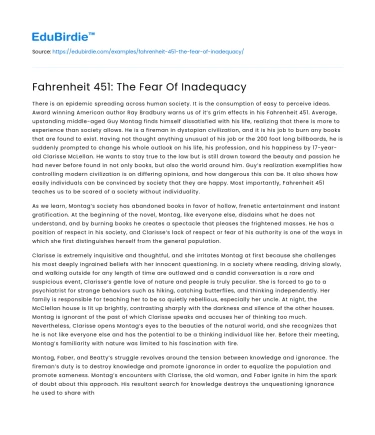There is an epidemic spreading across human society. It is the consumption of easy to perceive ideas. Award winning American author Ray Bradbury warns us of it’s grim effects in his Fahrenheit 451. Average, upstanding middle-aged Guy Montag finds himself dissatisfied with his life, realizing that there is more to experience than society allows. He is a fireman in dystopian civilization, and it is his job to burn any books that are found to exist. Having not thought anything unusual of his job or the 200 foot long billboards, he is suddenly prompted to change his whole outlook on his life, his profession, and his happiness by 17-year-old Clarisse McLellan. He wants to stay true to the law but is still drawn toward the beauty and passion he had never before found in not only books, but also the world around him. Guy’s realization exemplifies how controlling modern civilization is on differing opinions, and how dangerous this can be. It also shows how easily individuals can be convinced by society that they are happy. Most importantly, Fahrenheit 451 teaches us to be scared of a society without individuality.
As we learn, Montag’s society has abandoned books in favor of hollow, frenetic entertainment and instant gratification. At the beginning of the novel, Montag, like everyone else, disdains what he does not understand, and by burning books he creates a spectacle that pleases the frightened masses. He has a position of respect in his society, and Clarisse’s lack of respect or fear of his authority is one of the ways in which she first distinguishes herself from the general population.
Clarisse is extremely inquisitive and thoughtful, and she irritates Montag at first because she challenges his most deeply ingrained beliefs with her innocent questioning. In a society where reading, driving slowly, and walking outside for any length of time are outlawed and a candid conversation is a rare and suspicious event, Clarisse’s gentle love of nature and people is truly peculiar. She is forced to go to a psychiatrist for strange behaviors such as hiking, catching butterflies, and thinking independently. Her family is responsible for teaching her to be so quietly rebellious, especially her uncle. At night, the McClellan house is lit up brightly, contrasting sharply with the darkness and silence of the other houses. Montag is ignorant of the past of which Clarisse speaks and accuses her of thinking too much. Nevertheless, Clarisse opens Montag’s eyes to the beauties of the natural world, and she recognizes that he is not like everyone else and has the potential to be a thinking individual like her. Before their meeting, Montag’s familiarity with nature was limited to his fascination with fire.
Montag, Faber, and Beatty’s struggle revolves around the tension between knowledge and ignorance. The fireman’s duty is to destroy knowledge and promote ignorance in order to equalize the population and promote sameness. Montag’s encounters with Clarisse, the old woman, and Faber ignite in him the spark of doubt about this approach. His resultant search for knowledge destroys the unquestioning ignorance he used to share with nearly everyone else, and he battles the basic beliefs of his society.
While explaining the revisionist history of firemen to Montag in his home, Captain Beatty says, “We must all be alike. Not everyone born free and equal, as the constitution says, but everyone made equal . . . A book is a loaded gun in the house next door. Burn it. Take the shot from the weapon. Breach man’s mind.” It is important to note that Beatty’s whole speech has an ironic sound. He defends the disintegration of authenticity in a passionate, almost regretful tone. He is willing to defend the “equalization” of society while still remaining educated himself, and denounces the use of books as weapons while freely using them that way himself. Because of these ambiguities, Beatty is the most complex character in the book, and he uses his book-educated mind, his “loaded gun,” to manipulate Montag mercilessly. One wonders, as Faber does, if he chose his job after a fall from faith in books, as he claims, or to enable himself to gain legal access to books through his position of authority.
The same meaning could be included in existing media like television and radio, but people no longer demand it. According to Faber, Montag is really in search of “quality,” which the professor defines as “texture”—the details of life, that is, authentic experience. People need quality information, the leisure to digest it, and the freedom to act on what has been learned. Faber’s comment that a book has “pores” also evokes the sieve in the title “The Sieve and the Sand.” Trying to fill your mind by reading books is like trying to fill a leaking bucket, because the words slip from your memory before you can even finish reading anything. The arc of formerly prude and not individual Montag to becoming independent and critically analyzing his world exemplifies how vital this belief in the maintenance of ideals is.






 Stuck on your essay?
Stuck on your essay?

